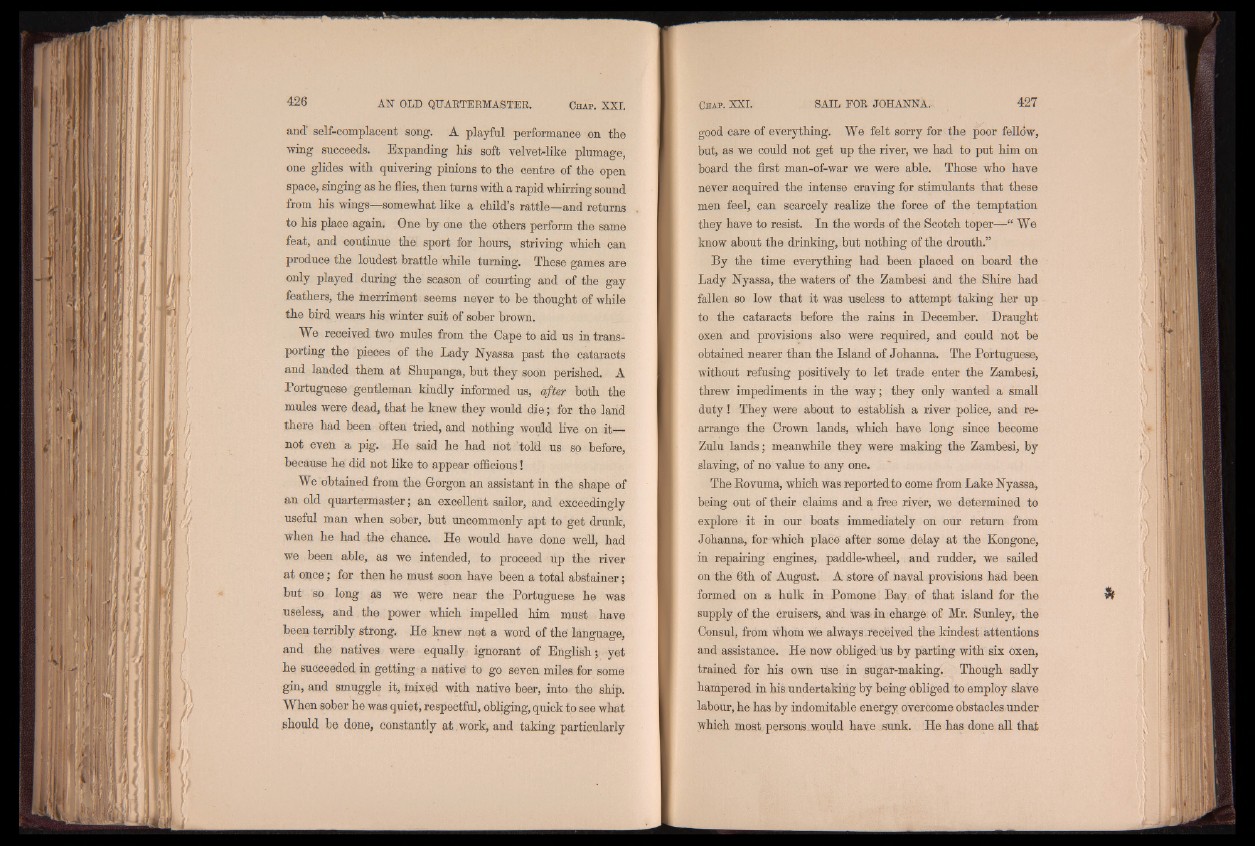
and' self-complacent song. A playful performance on the
wing succeeds. Expanding his soft velvet-like plumage,
one glides with quivering pinions to the centre of the open
space, singing as he flies, then turns with a rapid whirring sound
from his wings—somewhat like a child’s rattle—and returns
to his place again. One by one the others perform the same
feat, and continue the sport for hours, striving which can
produce the loudest brattle while turning. These games are
only played during the season of courting and of the gay
feathers, the merriment seems never to be thought of while
the bird wears his winter suit of sober brown.
We received two mules from the Cape to aid us in transporting
the pieces of the Lady Nyassa past the cataracts
and landed them at Shupanga, but they soon perished. A
Portuguese gentleman kindly informed us, after both the
mules were dead, that he knew they would die ; for the land
there had been often tried, and nothing would live on it—
not even a pig. He said he had not told us so before,
because he did not like to appear officious!
We obtained from the Gorgon an assistant in the shape of
an old quartermaster; an excellent sailor, and exceedingly
useful man when sober, but uncommonly apt to get drunk,
when he had the chance. He would have done well, had
we been able, as we intended, to proceed up the river
at once; for then he must soon have been a total abstainer;
but so long as we were near the Portuguese he was
useless, and the power which impelled him must have
been terribly strong. He knew not a word of the language,
and the natives were equally ignorant of English; yet
he succeeded in getting a native to go seven miles for some
gin, and smuggle it, mixed with native beer, into the ship.
When sober he was quiet, respectful, obliging, quick to see what
.should be done, constantly at work, and taking particularly
good care of everything. We felt sorry for the poor fellow,
but, as we could not get up the river, we had to put him on
board the first man-of-war we were able. Those who have
never acquired the intense craving for stimulants that these
men feel, can scarcely realize the force of the temptation
they have to resist. In the words of the Scotch toper—“ We
know about the drinking, but nothing of the drouth.”
By the time everything had been placed on board the
Lady Nyassa, the waters of the Zambesi and the Shire had
fallen so low that it was useless to attempt taking her up
to the cataracts before the rains in December. Draught
oxen and provisions also were required, and could not be
obtained nearer than the Island of Johanna. The Portuguese,
without refusing positively to let trade enter the Zambesi,
threw impediments in the way; they only wanted a small
duty! They were about to establish a river police, and rearrange
the Crown lands, which have long since become
Zulu lands; meanwhile they were making the Zambesi, by
slaving, of no value to any one.
The Bovuma, which was reported to come from Lake Nyassa,
being out of their claims and a free river, we determined to
explore it in our boats immediately on our return from
Johanna, for which place after some delay at the Kongone,
in repairing engines, paddle-wheel, and rudder, we sailed
on the 6th of August. A store of naval provisions had been
formed on a hulk in Pomone Bay, of that island for the
supply of the cruisers, and was in charge of Mr. Sunley, the
Consul, from whom we always received the kindest attentions
and assistance. He now obliged us by parting with six oxen,
trained for his own use in sugar-making. Though sadly
hampered in his undertaking by being obliged to employ slave
labour, he has by indomitable energy overcome obstacles under
which most persons wouLd have sunk. He has done all that